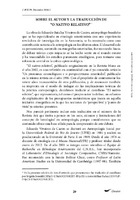| dc.rights.license | Licencia de Creative Commons Reconocimiento-NoComercial-CompartirIgual 4.0 Internacional (CC BY-NC-SA 4.0) | |
| dc.contributor.illustrator | Gonzalez, Pocho | |
| dc.creator | Viveiros de Castro, Eduardo | |
| dc.date.accessioned | 2019-10-30T11:12:35Z | |
| dc.date.available | 2019-10-30T11:12:35Z | |
| dc.date.issued | 2016-12-01 | |
| dc.identifier.citation | Viveiros de Castro, E. (2016). El nativo relativo. Avá. Revista de Antropología. Posadas: UNaM. FHyCS. PPAS; (29), 29-69. | |
| dc.identifier.issn | 1851-1694 | |
| dc.identifier.other | RA-229 | |
| dc.identifier.uri | https://hdl.handle.net/20.500.12219/2032 | |
| dc.identifier.uri | http://www.ava.unam.edu.ar/images/29/n29a02.pdf | |
| dc.description | Fil: Viveiros de Castro, Eduardo. Universidade Federal do Rio de Janeiro. Museu Nacional; Brasil. | es_AR |
| dc.description.abstract | Este artículo busca extraer las implicaciones teóricas del hecho de que la antropología no solo estudia relaciones, sino que el conocimiento así producido es él mismo una relación1 . Se propone, de este modo, una imagen de la actividad antropológica como fundada en el presupuesto de que los procedimientos característicos de la disciplina son conceptualmente del mismo orden que los procedimientos investigados. Entre tales implicaciones está el rechazo a la noción corriente de que cada cultura o sociedad encarna una solución específica de un problema genérico, llenando una forma universal (el concepto antropológico) con un contenido particular (las concepciones nativas). Al contrario, la imagen aquí propuesta sugiere que los problemas son ellos mismos radicalmente diversos, y que el antropólogo no sabe de antemano cuáles son. | es_AR |
| dc.description.abstract | This article attempts to extract the theoretical implications arising from the fact that anthropology not only studies relations, but that the knowledge it produces in the process is itself a relation. It therefore proposes an image of anthropology as an activity founded on the premise that the procedures characteristic of the discipline are conceptually of the same order as those it investigates. Among these implications is the rejection of the contemporary notion that each culture or society embodies a specific solution to a generic problem, filling a universal form (the anthropological concept) with a particular content (the native conceptions). Much the opposite: the image proposed here suggests that the problems themselves are radically heterogenic, and that the anthropologist cannot know beforehand what these will be. | en |
| dc.format | application/pdf | |
| dc.language.iso | spa | es_AR |
| dc.publisher | Universidad Nacional de Misiones. Facultad de Humanidades y Ciencias Sociales. Secretaría de Investigación y Postgrado. Programa de Postgrado en Antropología Social | es_AR |
| dc.rights.uri | http://creativecommons.org/licenses/by-nc-sa/4.0/deed.es | |
| dc.source | Avá. Revista de Antropología (Misiones), 12-2016; (29): pp. 29-69 http://www.ava.unam.edu.ar/index.php | |
| dc.subject | Conocimiento antropológico | es_AR |
| dc.subject | Imaginación conceptual | es_AR |
| dc.subject | Cultura | es_AR |
| dc.subject | Relación | es_AR |
| dc.subject | Perspectivismo | es_AR |
| dc.subject | Anthropological Knowledge | en |
| dc.subject | Conceptual Imagination | en |
| dc.subject | Culture | en |
| dc.subject | Relation | en |
| dc.subject | Perspectivism | en |
| dc.title | El nativo relativo | es_AR |
| dc.type | info:eu-repo/semantics/article | |
| dc.type | info:ar-repo/semantics/artículo | |
| dc.type | info:eu-repo/semantics/publishedVersion | |




